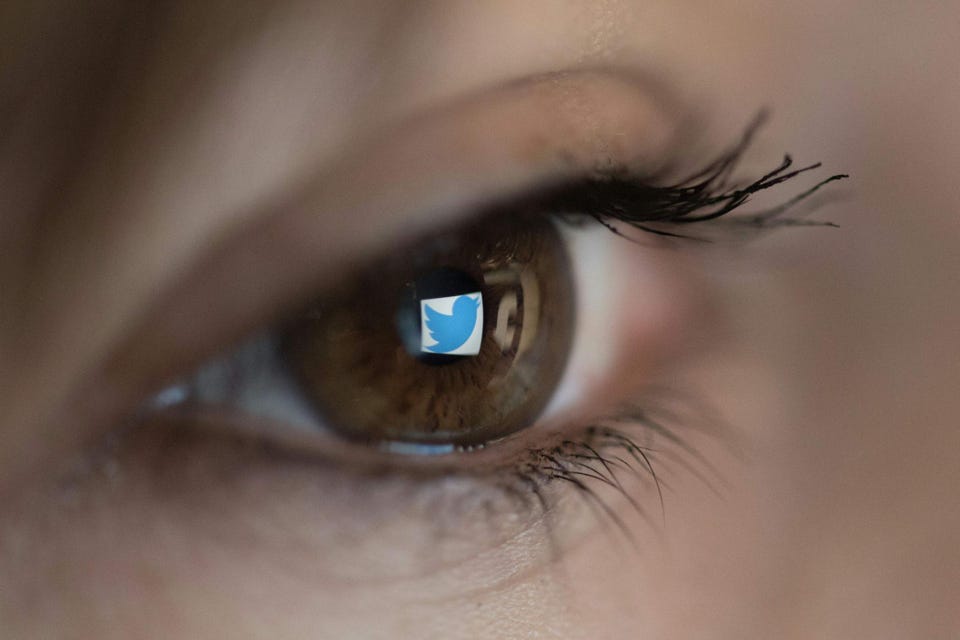Social Media Why Everyone Writes About Twitter More Than They Use It, Including Me John Brandon Contributor Opinions expressed by Forbes Contributors are their own. John Brandon covers social media trends. @jmbrandonbb Following New! Follow this author to stay notified about their latest stories.
Got it! Oct 10, 2022, 10:03am EDT | New! Click on the conversation bubble to join the conversation Got it! Share to Facebook Share to Twitter Share to Linkedin An illustration picture taken on March 22, 2018 in Paris shows a close-up of the Twitter logo in the . . .
[+] eye of an AFP staff member posing while she looks at a flipped logo of Twitter. (Photo by Christophe SIMON / AFP) (Photo credit should read CHRISTOPHE SIMON/AFP via Getty Images) AFP via Getty Images Twitter is an unwieldy, outdated social media platform that doesn’t really meet the needs of most users. There’s nothing special about it, and the features haven’t really changed dramatically in recent years.
Trolls are running rampant , and there are some serious questions about data integrity on the platform , so many of us have moved on to greener pastures. And yet, why do we keep analyzing it and talking about it? In recent years, Twitter has become the app we all love to hate. We’re enamored by everything Elon Musk does, drawn into the drama over whether he will actually complete the acquisition, and fret over the future of this one-time wunderkind of the tech startup space.
I’m as guilty as anyone. I remember using Twitter in the early days and tweeting constantly. Those were halcyon days when it seemed like it was so important to build up my follower counts.
Somewhere along the way, as I kept thinking and pondering what could save Twitter, or which features might actually help the company expand and attract new users, something interesting happened. I thought more about Twitter and wrote about it more often as a columnist but stopped using the app as often. I still tweet regularly, but in terms of turning to Twitter as a source of news and information or looking for new people to follow? Not so much.
That’s the core problem worth considering as Elon Musk has now said he plans to complete the purchase and become the driving force behind a transition into making Twitter useful and valuable again. I know what he is planning to do, because he’s made it pretty clear. He wants to turn Twitter into “the everything app” similar to WeChat in that you can use it for messaging, buying products, and communicating with people in a public town hall (akin to a product he once called X.
com ). That new direction doesn’t fully address the challenge ahead: how do you get people to start using it again? I believe it has less to do with technical achievements or mirroring what you can do with WeChat. It has more to do with perception and public sentiment.
MORE FOR YOU Hiring Refugees: How One Big Factory Did It The Biggest Threat To America’s Global Dominance In Software & Services Isn’t China—It’s Washington. The Best Mattresses For Heavy People That Are Built To Last Let’s be honest. Twitter has a bad name.
New features won’t help it survive. I’m reminded of the days when Apple was not exactly a hot commodity like they are now. This was quite a few years ago when you could buy a “knock off” Mac computer that ran the same operating system.
The Mac was just another computer and this was long before the iPhone. Apple changed the perceptions about the Mac back then. It wasn’t just another computer, it was an experience .
It was special. There was something about the Mac that helped you achieve more in life. This mindset carried over to the iPhone and other Apple products to lead to what we all know today as one of the most beloved brands on the planet.
If you own an iPhone, you know it can just disappear in your hand at times and help you focus on what you need to do. That’s not exactly true with Twitter. Instead, people like me analyze the company itself and their lack of innovation.
As a messaging client, it doesn’t disappear. All you can think about is the fact that people are abusive, that content is filtered, that Twitter is in trouble. The more we analyze the brand the more the flaws emerge and make us realize how crippled it is.
We spend more time thinking about Twitter than using it because is has so many flaws. My hope is that Musk does more than just add new features similar to WeChat. His X.
com vision won’t save the company. Changing perceptions about security, addressing troll behavior, resolving the rampant political discord — that’s the secret to success. Fix the brand, then fix the product.
We’ll see if he can accomplish both. John Brandon Editorial Standards Print Reprints & Permissions.
From: forbes
URL: https://www.forbes.com/sites/johnbbrandon/2022/10/10/why-everyone-writes-about-twitter-more-than-they-use-it-including-me/



